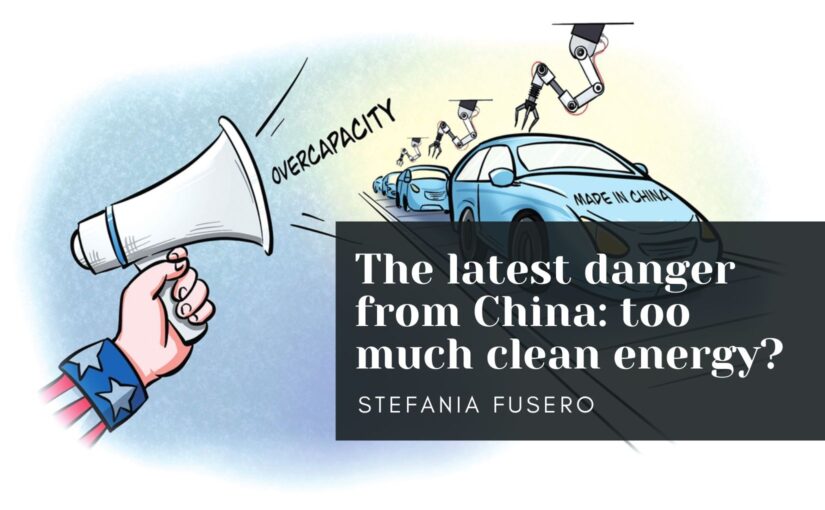This brief article by Friends of Socialist China advisory group member Stefania Fusero, originally published in Italian in Futura Società, brings some much-needed clarity to the question of US allegations concerning China’s “over-capacity”, particularly in green technologies such as renewable energy, electric vehicles and lithium-ion batteries.
Stefania rightly points out that, by demanding that China curtail its production of materials that are essential for a global green transition, US Treasury Secretary Janet Yellen “implicitly admits that the priority for the US government is not to join in the global fight against climate breakdown, but instead to sustain the profits of US corporations and financial elites.” This in turn serves to reiterate that “Western governments serve the interests of small oligarchic minorities, not the masses of their populations.”
Stefania notes that the diverging priorities of China and the US are amply evidenced by the fact that, while China directs enormous resources towards development, infrastructure, sustainable energy, and the fight against poverty, the US devotes enormous resources to war, domination, hegemonism, and the pursuit of a ‘rules-based international order’ where the rules are written in Washington and serve the exclusive interests of the US ruling class.
The article concludes by predicting failure for the US’s tactic, citing Radhika Desai’s recent article in CGTN: China “will not roll over and play dead when asked to harm its own economy, its own workers and the possibility of dealing with climate change, all only so that the interests of unproductive inefficient and financialised US corporations may be advanced.”
The article was translated into English by the author.
Giuseppe Masala gave an exhaustive explanation in l’Antidiplomatico of the real reasons which brought US Treasury Secretary Janet Yellen back to China.
Among other things, after quoting from a statement by Yellen – ”we now see the development of excess capacity in ‘new’ industries such as solar panels, lithium-ion batteries and electric vehicles” – Masala rightly states that, translated into simple language, Yellen is saying that the US productive system cannot cope with Chinese competition.
Simplicius the Thinker gets to the same conclusion in his post Yellen Dispatched to Beg China for Face-Saving Slowdown: “The fact of the matter is, China is simply leaping ahead of the decrepit, deteriorating U.S. by every measure and the panicked elites have sent Yellen to beg China to ‘slow down’ and not embarrass them on the world stage.”
There’s more to it, though. When Yellen denounces and laments China’s “overcapacity of clean energy” – specifically mentioning solar panels, electric vehicles and lithium-ion batteries – she gets straight to the issue of the global climate breakdown.
In this context, contrary to incessant Western smearing campaigns, China has acted consistently with the commitment to defend the environment Xi Jinping announced in 2014, and has translated it into a climate strategy the extent of which has never been seen before, as acknowledged by the president of the Environmental Defense Fund: “the world has never before seen a climate program on this scale.”
In solar energy alone, the International Energy Agency noted that China’s PV-focused industrial policies have contributed to more than 80 percent cost reductions, helping the sector become the most cost-effective electricity generation technology in many parts of the world – an important contribution to global decarbonisation.
Complaining about what she calls “clean energy overcapacity”, Yellen implicitly admits that the priority for the US government is not to join in the global fight against climate breakdown, but instead to sustain the profits of US corporations and financial elites. She lays bare the fact that Western governments serve the interests of small oligarchic minorities, not the masses of their populations.
Just take a simple look at the composition of the US public debt, which has reached the stratospheric figure of $34 trillion, of which 14 trillion has gone to military spending since the start of the war in Afghanistan. While the US has been throwing money into the bottomless pit of its endless wars ‘on terror’, China has been investing in the development of its economy, its infrastructure, as well as the fight against poverty, demonstrating that the priority of the PRC is development, whereas the priority of the US is war.
It is thus unsurprising that the foreign policies of the two countries are poles apart, both in the guiding principles and the parlance set out in their respective official documents, and in the posture adopted towards other countries.
China uses the language of diplomacy, rejects the logic of opposing blocs, is not part to any military alliances, and engages with partners for its various international projects, the Belt and Road Initiative first and foremost, in ways which are beneficial both to itself and to them. The US, on the other hand, does not want partners, but vassals from whom it demands exclusive allegiance to the point of agreeing to sacrifice their own interests, and does not hesitate to use the weapons of military and economic threat, in line with a purported ‘international rules based order’, which the US bends to its own will and convenience.
Will China bow to the requests and more-or-less veiled threats coming from the USA and its satellites?
As Radhika Desai writes in a recent article: “Sadly, for Yellen, China is neither Japan nor Europe but a socialist economy whose government is oriented towards advancing egalitarian development for its people. Yellen will find it willing to cooperate for the benefit of people and the planet. But it will not roll over and play dead when asked to harm its own economy, its own workers and the possibility of dealing with climate change, all only so that the interests of unproductive inefficient and financialized US corporations may be advanced.”


